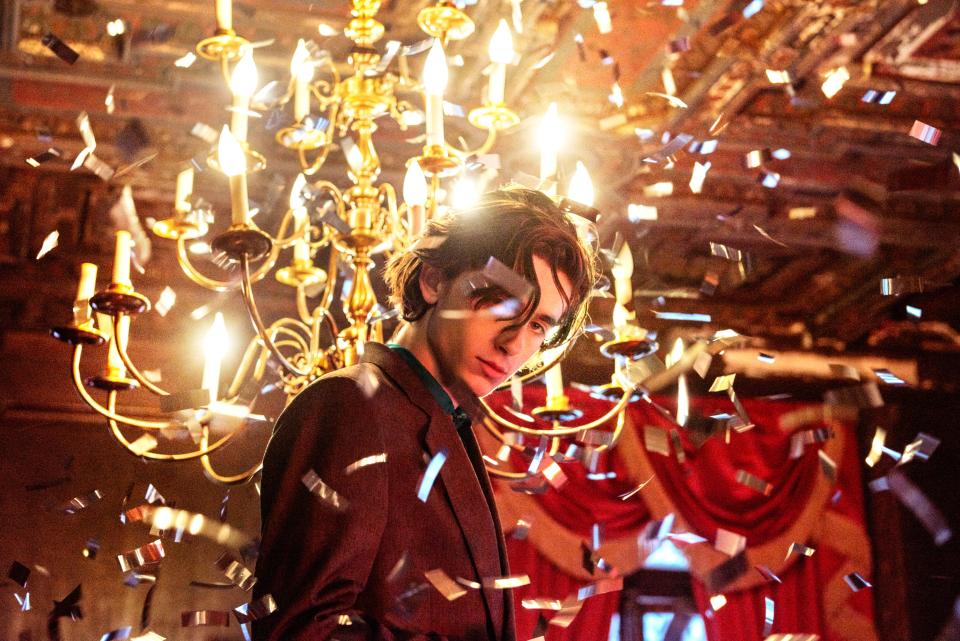Timothée Chalamet Is The King We Deserve
There’s a scar on King Henry’s face. Whether that minor injury was sustained on a battlefield or in a drunken brawl is never addressed, it’s just there. Usually, it wouldn’t be that remarkable, but when that scar is on Timothée Chalamet—the poster boy for softness—you take notice. In his enviably fast ascent, Chalamet has mastered the art of emotional dexterity, flitting between euphoria and devastation with unmatched ease. But David Michôd’s The King requires something different from him. Like a small scar on an otherwise blemish-free face, Chalamet’s wayward prince is antique porcelain made imperfect by a single crack: hardened, aged, scathed.
Before he’s Henry V, King of England, he’s Hal, a 15th century bad boy who’d rather drink and sleep his way around Eastcheap than claim his birthright to the throne. But when his father (Ben Mendelsohn, magnetic in the short time he appears) dies, he assumes the responsibilities he ran away from for so long. That transformation from rebellious prince to righteous king is confoundingly instantaneous. Michôd and co-writer Joel Edgerton deserve credit where it’s due for attempting to condense Shakespeare’s Henriad into a single film, but the final result fails to wrestle with these personal conflicts of having such a position thrust upon you.
The fact that Chalamet is quietly spectacular in a film as cold as this makes his portrayal of King Henry even more revelatory. He’s well-versed in traversing the full spectrum of human emotion, but all that is needed of him in The King is a permanent scowl and a furrowed brow. He, of course, achieves more than the minimum, enhancing Henry’s rough stoicism so that the moments when he speaks (in a rather impressive English accent, might I add) barely above a whisper resonate as much as a rousing speech on the battlefield. The subtle curl of a lip and sudden dart of the eyes suggests a boy—and that’s who he is, a boy—whose mind is always ticking, always moving the pieces on the board with a reticent hand. It’s easy for good actors to shine when the film matches their quality, but Chalamet’s talent is apparent even when the film doesn’t succeed in tandem with him. It’s why he’s one of the best actors of his generation.
Henry’s hesitation comes from his vehement pacifism. He’s seen how combat has damaged his only trusted confidant Falstaff (Edgerton, jumping at the chance to be the comic relief), and would rather sacrifice himself than any faceless soldier. The King grows in cinematic scope and stakes as Henry declares war on France, but for a film that interrogates man’s lust for power and bloodshed, the film is uninterested with sensational violence. Sure, there is a severed head or two, but the few fight sequences purposefully lack in impressive choreography. Clunky and ill-fitting armor dwarfs its wearers who flounder on the ground, with Henry harboring a preference for wrestling over swordplay. Even in an impressive long take during the Battle of Agincourt, Michôd avoids making warfare look like something to be admired.
In an interview from 2016, Edgerton called The King “Game of Thrones meets Shakespeare.” The film does resemble the fantasy epic to some extent, right down to the claustrophobic, muddy combat that recalls the Battle of the Bastards. But The King doesn’t match the intrigue and excitement of Thrones even in the latter’s worst moments. Despite powering its way through Shakespeare’s plays, The King moves at such a leisurely pace that it’ll test many viewers’ patience. So much of the film involves noblemen—always getting lost in formal, era-appropriate language—strategizing in rooms and tents, followed by a depiction of what they just planned. It’s the inevitable downside to an endeavor averse to sensationalism: sterile monotony.
When it threatens to become boring, The King deploys its glimmering jewels. The score from Nicholas Britell (that’s Emmy-winning composer of Succession Nicholas Britell to you) is a delicate mood-setter until it explodes in bellowing horns and a roaring choir. The performances are uniformly potent—especially as it seems like the casting requirement was to not speak in your regular accent—but it would be a disservice not to mention Robert Pattinson. As Henry’s rival, the Dauphin of France, Pattinson is at his most unhinged and audacious, in a performance so batshit, it feels like it was plucked straight from a dazed fever dream. He’s more concerned with whether he could, that he never stopped to consider whether he should—but I’m grateful that thought had never crossed his mind, because Pattinson lights up what would’ve been an otherwise dull two hours with all of his unrestrained madness, embellished with a hammy French accent. (I mean that in a good way.)
It takes a long time for Henry’s arc to take shape, when it becomes clear that this reluctant king is not a leader but a pawn liable to manipulation. The story of the king’s reign is ultimately a tragedy, one that sneaks up on you as it finds the opportune time to strike. The King is a finely executed film that was destined to get lost in the many period dramas following burdened royals, but it’s Chalamet’s sensational performance that rescues it from such a fate. He commands every frame he’s in, even when everything that surrounds his magnetic presence fails to keep up with him.
Robert Pattinson’s lob, fling me out of a trebuchet!
GQ Cover Story
Every once in the rarest while, a young actor shows up in a movie like an alien—anonymous and yet in possession of such preternatural talent that audiences start thinking about the actor’s future not in years but in decades. Call Me by Your Name’s Timothée Chalamet is just such an alien, and just such a once-in-a-generation talent.
Originally Appeared on GQ



